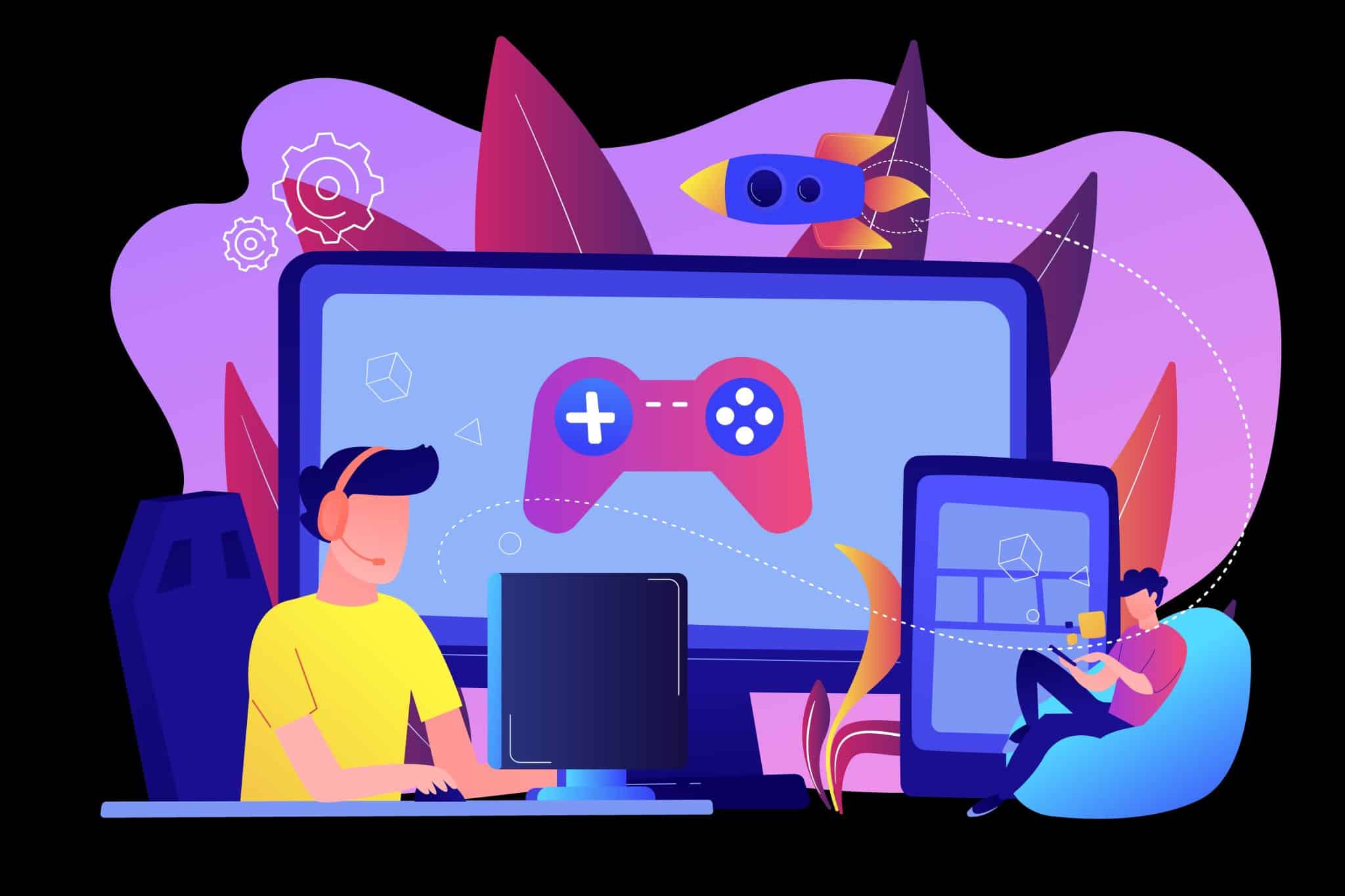Table of Contents
ToggleThe mobile gaming industry in 2025 is a powerhouse within the entertainment ecosystem, boasting billions of players and generating gigantic revenue. With advancements in smartphones and high-speed internet, mobile games now offer rich graphics, immersive gameplay, and multiplayer experiences. Mobile games are no longer just casual time-fillers; they’re a vital source of amusing experiences with a diverse audience spanning all demographics.
This article will explore the essential aspects of mobile game development in 2025, covering game engines, platforms, and game modding. It will address queries on the game development process, game engine selection, platform selection, and modding trends in 2025. Finally, it aids in finding the best game development company in 2025 for your development projects.
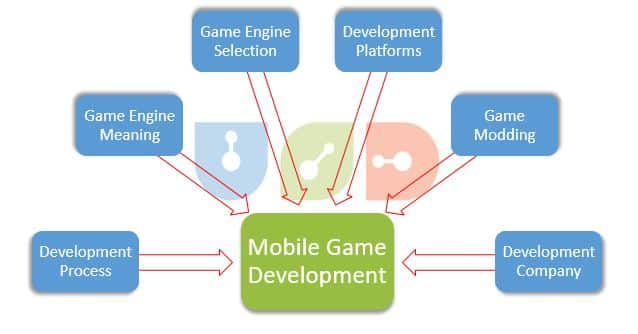
How to Develop Mobile Games?
So you have a concept of a game that has a high demand and a potentially large market; what else? Before you begin investing in the idea, invest some time in reading about the process and what are its essentials. Developing mobile games requires careful planning, a blend of creativity, solid knowledge, and deep technical skills. Here’s a basic roadmap:
1. Idea Conception and Planning
Begin by brainstorming and refining the concept, along with validation, feasibility, and revenue projections. Determine the game’s genre, core mechanics, target audience, and monetization model, let alone the preferences of prospects.
2. Game Design and Prototyping
Create a basic prototype to test ideas, considering the taste of potential gamers. It includes wireframing the game flow and designing the core gameplay mechanics. User interface and user experience are the core elements of design that encourage engagement and retention.
3. Asset Creation (Visuals, Audios, Others)
Develop visuals, sound, and music assets that shape the game’s aesthetics. It involves creating characters, their movements, environments, soundtracks, and effects. Complex games require more intricate assets that take time plus budget in creation, besides expertise and experience.
4. Coding and Scripting
Write the code that brings the game to life and write APIs necessary for integration. Develop game logic, manage player input, and create interactive elements that uplift user engagement. Provide sufficient collaboration and sharing tools for users as they attract more prospects.
5. Testing and Debugging
Rigorously test the game for bugs, gameplay consistency, and performance optimization. It takes both functional testing and user testing, which is also known as internal and external testing. The game must perform well as well as be enjoyable for longer engagement sessions.
6. Deployment and Distribution
Publish the game on platforms like Google Play or Apple App Store and provide download links on social media and landing pages. Consider regional restrictions, app store guidelines, and marketing strategies for successful distribution through multiple channels.
7. Necessary Core Skills
- Proficiency in languages like C#, Java, and C++ is essential for coding game mechanics, user interfaces, and more.
- A solid understanding of game theory, level design, and user engagement helps in creating captivating experiences.
- For 3D games, skills in 3D modeling and animating objects, characters, and environments are vital.
- Many mobile games utilize 2D graphics, requiring skill in creating assets like characters, backgrounds, and interfaces.
- Good sound design enhances immersion, and music composition skills help in crafting soundtracks that match the game’s vibes.
What are Mobile Game Engines?
A game engine is a software framework that simplifies game development by providing tools for handling graphics, physics, sound, and scripting. Game engines streamline the complex process of coding from scratch, allowing developers to focus more on creative aspects. In this section, we will discuss their key features and the best game engines out there for a brief review.
1. Key Features of Game Engines
The following are some key features that define a game engine’s core functionality:
Game Object System
The object system is the backbone of any game, managing all in-game elements, such as characters, vehicles
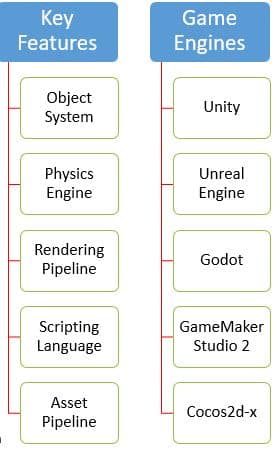 , scenery, and interactive objects. It enables developers to define object behaviors and interactions, structuring the game’s environment cohesively.
, scenery, and interactive objects. It enables developers to define object behaviors and interactions, structuring the game’s environment cohesively.
Physics Engine
The physics engine simulates real-world physical properties, making gameplay more immersive. It handles gravity, collision detection, and object interactions to create realistic motion, such as characters moving smoothly or objects responding accurately to impacts.
Rendering Pipeline
This feature is crucial for producing high-quality visuals. The rendering pipeline processes graphical data and
renders images on the screen, supporting functions like lighting, shading, and texture mapping for smooth, high-performance graphics.
Scripting Language
Scripting languages within game engines, such as C# in Unity or Python in Godot, allow developers to customize gameplay mechanics, artificial intelligence, and interactive elements. This flexibility helps developers tailor the game to fit specific creative and functional needs.
Asset Pipeline
An asset pipeline manages the importing, processing, and storage of visual and audio assets, including textures, sounds, animations, and models. It ensures that assets integrate seamlessly into the game, maintaining performance while enhancing the game’s overall aesthetic quality.
2. Best Game Engines
Have a look at some of the most popular game engines in 2025, which might aid your selection.
Unity
Unity is highly regarded for its user-friendly interface and extensive asset store, which offers ready-made assets for quick development. Its cross-platform support aids in both 2D and 3D games, allowing developers to create games for multiple platforms from a single codebase. Unity’s versatility and large community make it ideal for projects of varying scales.
Unreal Engine
Unreal Engine is known for its stunning graphics capabilities and advanced tools, making it especially popular for high-quality 3D games. It supports complex projects with powerful rendering, physics, and AI features. While the functionality is robust, its steeper learning curve makes it ideal for proficient developers or those creating ambitious projects.
Godot
Godot is a free, open-source engine with an intuitive design, offering support for both 2D and 3D games. Ideal for beginners, Godot provides flexibility with a user-friendly scripting language and modular structure, enabling developers to focus on creativity without heavy costs.
GameMaker Studio 2
Best for 2D games, GameMaker Studio 2 features a drag-and-drop interface, allowing beginners to build games without extensive programming experience. It also offers scripting capabilities, making it a great choice for both novice and intermediate developers focusing on 2D projects.
Cocos2d-x
This lightweight, open-source engine is optimal for 2D mobile games, with high performance and efficient memory usage. Cocos2d-x is ideal for developers seeking an efficient engine to develop mobile games.
Other Notable Mentions
Engines like CryEngine and Buildbox provide additional options, each with unique features catering to specific development needs. They cater to everything from advanced graphics in CryEngine to simplified workflows in Buildbox.
How to Choose a Game Engine?
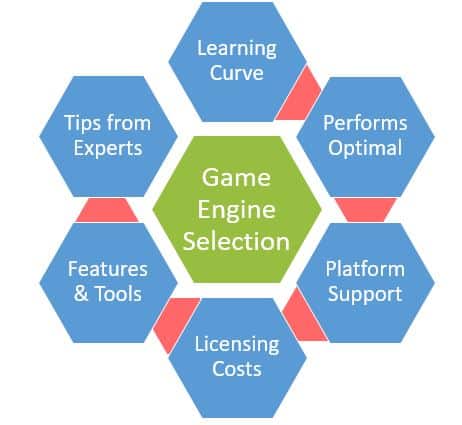
Selecting the right game engine is crucial, as it impacts the ease of development and the quality of the final product. Each engine has its unique tools and strengths that are suitable for different project needs. Here are some considerations for selecting the most suitable one for your project:
1. Learning Curve
Choose an engine that matches your team’s experience. Some engines, like Unity and Godot, are beginner-friendly, while Unreal may require more expertise.
2. Performance
Evaluate the engine’s performance capabilities. Engines with advanced optimization tools, such as Unreal Engine for 3D games, can handle high-quality graphics and complex physics.
3. Platform Support
Make sure the engine supports the platforms you intend to target, such as iOS, Android, or PC.
4. Licensing Costs
Review the licensing fees. Unity offers a free version with some limitations, while Unreal Engine’s fees are based on revenue share.
5. Features and Tools
Consider the built-in features and extensibility. An engine with a large asset store and third-party plugins, like Unity, can save development time.
6. Few Tips from Experts
- Spend time researching and trying out a few engines to see which fits your project best.
- Pick an engine that aligns with your team’s skill set so they can work more efficiently.
- Begin with a smaller project to gain hands-on experience with the engine before moving on to larger, more complex games.
Best Game Development Platforms
Choosing the right platform is critical for the success of a mobile game, as it determines the reach, performance, and potential revenue. Let’s review the top game development platforms in 2025:
1. iOS
Apple App Store
The Apple App Store is a major platform for mobile games, known for its large user base of high-spending customers. Apple’s strict guidelines and high-quality standards ensure that only polished, well-functioning games are published.
Benefits
High revenue potential, secure ecosystem, and a premium audience.
Challenges
Stringent app review process and platform exclusivity.
2. Android
Google Play Store
Google Play Store is the most widely used platform for Android devices, providing a vast audience reach. With a more flexible publishing process, it’s a go-to platform for indie developers and large studios alike.
Benefits
Broad reach across devices and regions, flexible app review, extensive analytics tools.
Challenges
High competition and market fragmentation due to varied device types and operating system versions.
3. Notable Platforms
Amazon App Store, Huawei AppGallery
Amazon App Store and Huawei AppGallery are alternative platforms that cater to niche markets. Amazon’s platform is popular in regions where Amazon devices are common, and Huawei’s AppGallery is crucial in markets like China.
Benefits
Access to exclusive user bases and reduced competition.
Challenges
Smaller audience compared to Apple and Google, with unique publishing requirements.
4. Emerging Platforms
Cloud Gaming Services, VR/AR Platforms
With the rise of cloud gaming services (like Google Stadia and Xbox Cloud Gaming), mobile game developers can now create complex games that run on powerful servers. They are accessible on any device with a stable internet connection. AR/VR development platforms like Metaverse are a whole different genre where experience and expertise matter a lot.
Benefits
High-quality games with low device dependency, surging reach through VR and AR innovations.
Challenges
Requires strong internet infrastructure and higher development costs for immersive experiences.
What is Game Modding?
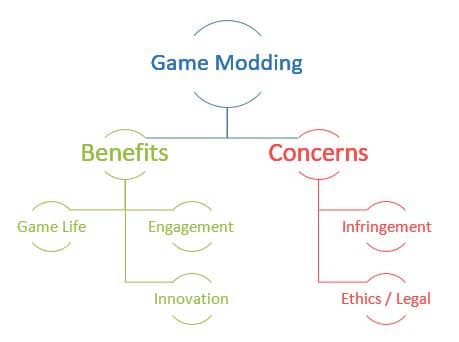
Game Modding is the process of altering a game’s code, assets, or settings to create new content or entirely new experiences within an existing game. Modding is gaining popularity equally in mobile gaming and PC gaming, offering unique opportunities for players as well as developers. In this section, we will list the benefits of game modding along with its ethical and legal concerns.
1. Benefits of Modding
Modding offers significant benefits to both players and game developers, creating a vibrant ecosystem that extends a game’s lifespan, deepens player engagement, and fosters innovation.
Extended Game Life
Modding adds new content and creativity to games, keeping them relevant long after their initial release. Players continuously generate custom maps, characters, and storylines, which attract new users and retain existing ones, extending the game’s lifecycle.
Increased Player Engagement
Modding empowers players to shape their gaming experience, leading to greater engagement and loyalty. By giving players creative control, developers foster a sense of ownership, encouraging players to invest more time and energy into the game.
Community-Driven Innovation
Modding communities are highly inventive, constantly coming up with fresh ideas, gameplay mechanics, and design elements. This feedback loop offers developers valuable insights, helping them understand what players enjoy and inspiring future game updates or entirely new projects.
2. Ethical Considerations and Legal Issues
While modding enhances gameplay, there are ethical and legal considerations to ensure the process respects creators and maintains a safe environment:
Respecting Intellectual Property Rights
Modders and developers must honor the original creator’s intellectual property rights. Modding should work within the developer’s guidelines, ensuring that content does not infringe on trademarks or copyrighted material.
Avoiding Harmful or Illegal Modifications
Modding should focus on improving the game rather than compromising user safety or security. Developers may prohibit mods that introduce harmful content or exploit vulnerabilities, preserving the game’s integrity and protecting players.
Best Mobile Game Development Company
Partnering with the best mobile game development company can win you the ‘real’ game or lose it. It makes a substantial difference in the quality and success of a game, let alone its user journey. Use the subsequent criteria to identify the best game development outsourcing partners.
1. Expertise and Experience
Look for companies with a proven track record in mobile game development, especially in the specific genre or style relevant to your project. Experience in genres like RPGs, casual games, or VR/AR games indicates that the team understands the nuances of those types and can deliver on the project’s specific needs.
2. Portfolio of Successful Games
A strong portfolio showcases previous projects, illustrating the company’s ability to deliver high-quality, engaging games. An impressive portfolio also indicates versatility, as a range of different games demonstrates the team’s ability to adapt to various concepts and styles.
3. Technical Capabilities and Tools
The company should have access to the latest game development tools and engines, such as Unity, Unreal Engine, or Godot, as well as expertise in VR/AR if required. Modern tools enable developers to create games with high-quality graphics, physics, and gameplay mechanics, essential for meeting today’s player expectations.
4. Communication and Collaboration Skills
Transparent and regular communication is essential throughout the project lifecycle. Look for companies that provide regular updates, encourage feedback, and have established collaboration workflows. It ensures that your vision is understood and executed accurately, minimizing the risk of misalignment.
5. Pricing and Project Management
Finally, consider whether the company’s pricing aligns with your budget. Strong project management practices, including milestone tracking and time management, are also key to delivering the game on schedule and within scope.
Conclusion
Mobile game development in 2025 is a dynamic and evolving field with limitless potential. Master the basics of game development, choose the right game engine, and leverage modding to create engaging, innovative games that resonate deeply with players. Selecting the right platform—whether iOS, Android, or emerging VR/AR platforms—can be a game-changer. For aspiring developers, this is an exciting time to dive into mobile game development.
With the right skills and the support of a qualified development company, anyone can create market-ready games that outshine competition. If you want a fair share in the future of mobile gaming, couple your groundbreaking ideas with our new technologies and stack. Together, we can shape the next generation of mobile games, so contact Unique Software Development today.

